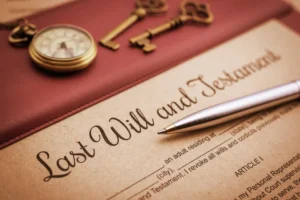What is a Testamentary Trust
A testamentary trust is trust created under a Last Will and Testament and it is used to protect and preserve property for one’s beneficiaries. The Testator (i.e. the maker of the Will) will appoint Trustees to hold and manage the assets for the benefit of the beneficiaries.
The testamentary trust gives the testator control over how and when the assets will be distributed to their beneficiaries. For instance, the trust can provide that funds will be will be used for the education of minor children or that property can only pass onto their children when they attain the age of 25 years. This will ensure that the chances of misuse of the assets will be minimized.
Unlike a Living Trust, a testamentary trust only comes into effect after the death of the Testator.
The difference between a Testamentary Trust and a Living Trust
Testamentary trusts and living trusts are both made for the protection of assets, however, they are created in different ways and either can be used depending on one’s preference:
• Whereas a testamentary trust is a trust created in a Will, it only becomes effective after the death of the testator/settlor, whilst a Living Trust is created and managed during the Settlor’s lifetime.
• A testamentary trust must go through probate (i.e., the court process) to ensure the validity of the Will before it can be effected, and a living trust takes effect upon establishment.
• Since the Will has go through the court process, the testamentary trust therein becomes a public document and the beneficiaries’ entitlements under such trust are in the public domain, whereas in a living trust the contents of the trust remain private.
• Under a testamentary trust, the transfer of the property is only done after the demise of the testator and until such time the testator has compete control over their assets, whereas in a living trust the property is transferred to the trust during the settlor’s lifetime and the assets owned by the trust.
• A testamentary trust is simpler to create and cheaper than a living trust in that it is created in the Will.
Who are the main parties in a Testamentary Trust?
Under a testamentary trust, and indeed most trusts, the following are three main parties;
- The Settlor- this is the person who owns the Assets that will be placed in Trust. In the case of a testamentary trust the settlor will be the one who writes the Will (i.e., the Testator) After the death of the settlor, the assets will be transferred to the Trustee for the benefit of the beneficiaries.
- The Trustees – these are the people who hold the legal title to the Trust assets and are appointed by the settlor. The assets are held in trust for the beneficiaries. The trustees should be competent and trustworthy as they have a legal duty to hold and manage the assets in the best interest of the beneficiary and are held to a high standard to account. They have a fiduciary duty to act in utmost good faith and cannot use the assets for their own use.
- The Beneficiary – this is any person to whom a gift may be made, and therefore is the person that will benefit from the trust. The Beneficiaries can be family members, friends or even charitable organizations.
Why Have a Testamentary Trust
A testamentary trust may be created for several reasons: for example;
- To hold property on behalf of minor children under the age of 18 years until such time as they come of age and are mature enough to hold and manage the property themselves.
- To hold property on behalf of children and dependent’s living with disabilities. A fund can be set up to meet their needs for their lifetime, if need be, thus providing them with financial security.
- To protect property from financially irresponsible children by ensuring the inheritance is distributed in a controlled manner to prevent them from squandering their inheritance.
- To ensure the property is preserved for use by the family and future generations, for example, preserving the ancestral home for use by family members for a long time to come.
- To provide funds for benefit and maintenance of the beneficiaries.
- To benefit from certain tax advantages such as stamp duty, capital gains tax and income tax exemptions.
Conclusion
A Testamentary Trust is a great tool used in estate planning it ensures that assets are distributed and protected in accordance with the testator’s wishes. It allows the maker of the trust to continue to have control over their assets while they are still living and the assets only move into the trust once they have passed away.
Contact us
- Having a testamentary trust in a will depends on your particular needs, and it is important to always seek legal advice on the best options available to you. For more information on testamentary trusts get in touch with our Estate Planning team at ep@lexgroupafrica.com.
Article by Gladys Mboya
Disclaimer
This article is intended for general knowledge only. It does not create an advocate-client relationship between any reader and Mboya Wangong’u & Waiyaki Advocates.








